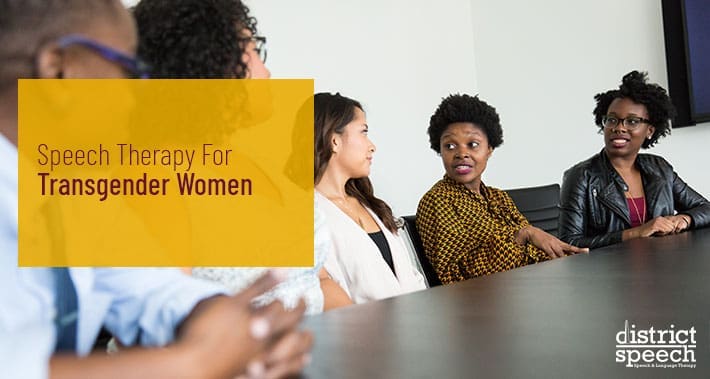
After years of questioning your gender, you’ve finally decided to begin your transition.
Congratulations!
If you’re like most trans women, you spent years doing deep dives into research on the different ways to transition.
Maybe you’ve planned out the course of hormones you want to take.
You planned out your new wardrobe and fashion sense.
You know how you want to style your hair.
You’ve considered any surgeries you want to get.
And, you may be considering voice training for transgender women.
You’ve seen the “heat from fire” memes, you’ve looked up the videos, but you’re still having difficulty putting it all together.
You might see people suggest listening to recordings of your voice to train your voice (this is a bad idea, read the linked article to find out why).
Nonetheless, when it comes to vocal training, trans women and trans feminine folks have unique challenges.
Here at District Speech, we’re here to help.
Our speech therapists have a special interest in working with trans women and trans feminine nonbinary people, helping them develop a vocal pattern that better matches their gender identity.
RELATED: Voice Training For Nonbinary People
We also have transgender voice coach Sophie Edwards, who is transgender herself.
Whether or not your voice causes you dysphoria, the team here at District Speech can help.
Keep reading to find out how.
Why Should Trans Women Get Speech Therapy?
The truth is, there’s no reason why trans women need to get speech therapy.
While some trans women are fortunate enough to have a passably feminine voice pre transition, others don’t.
However, not everyone’s goal is to “pass” as a cis woman.
There’s nothing wrong with that – if you’re happy with your voice, that’s great.
It is absolutely NOT our intention to make anyone feel ashamed of their voice, as it currently is.
However, we also recognize there is a need for speech therapy treatments geared specifically toward trans feminine people.
research shows that speech therapy can help trans women communicate in a more gender specific style, thereby improving mental wellbeing.
Having heard from a number of people from within the trans community, here are some of the reasons commonly given for why vocal training for trans women is important.
RELATED: Staying Motivated To Do Your Voice Feminization Training When You Don’t Really Want To
1. Safety
The sad reality is that openly trans women aren’t as safe as their cis counterparts.
A 2021 research study found that approximately half of trans women have been a victim of a transphobic hate crime.
For many, the idea of “passing” as a cis woman can help reduce their gender dysphoria, but it also has an undercurrent of safety attached.
The less you appear to be trans, the less likely you are to be a victim of transphobic violence.
And in many cases, one’s voice is their most obviously clockable aspect.
While trans visibility is important, that’s not a burden everyone can handle.
2. To Stave Off Dysphoria
Your voice may not be the only thing that causes you dysphoria, but it’s one of the more common ones among trans women.
For many trans feminine people, a large part of transition involves taking a look at what causes the greatest amount of gender dysphoria, and addressing it.
Voice training for transgender women can help with dysphoria.
3. To Improve Self Confidence
If you’re a trans woman with a voice that doesn’t match your identity, it can create issues with self confidence.
In particular, you might hold back from expressing your opinions and ideas because of the voice you’re stuck with using to do so.
This can cause you to miss out on opportunities in both your career and your personal life.

How To Train Your Voice For Transgender Women
When it comes to vocal training, a lot of trans women begin with a focus on just =”https://districtspeech.com/the-parts-of-speech-pitch/”>pitch.
While it’s true that the average woman’s voice register is in a higher pitch than the average man’s, focusing on that alone isn’t going to get you the results you want.
If it did, you could just talk in falsetto all day.
But pushing your voice to be in a higher register can actually be more detrimental to your efforts.
First of all, it can damage your vocal chords and larynx.
If you’re constantly pushing your voice outside of its natural range, you may end up hurting your voice, leaving you with a raspier, lower voice than when you started.
But as well, if you send your voice too high, it can seem a little off to the people you’re speaking to.
It’s difficult to put a finger on this quality specifically, other than to say it seems unnatural.
On top of that, there are cis women with deeper voices who still sound unmistakably like women – consider Cher, Toni Braxton, and Kathleen Turner.
So what’s the differentiator?
Many factors influence the way your voice sounds.
One of the most major factors is your hormones.
In many ways, having gone through testosterone driven puberty has done its damage to your voice.
Short of surgical options, you can’t undo that.
This is the case regardless of which puberty you’ve gone through that was testosterone driven.
In other words, voice training for trans men is different because testosterone (usually) naturally deepens their voice.
There are some techniques which can increase your pitch, but they won’t make you sound like a Disney princess.
However, there are changes you can make to help your voice pass as more traditionally feminine.
In particular, when doing speech therapy for trans feminine people, a couple areas that we focus on are your intonation and resonance.
What does that mean?
It’s referring to the musicality of your voice, the way your voice hits different notes as you speak.
Traditionally masculine voices tend to be flatter, more monotone, with resonance emphasized further back in the throat.
If you were socialized to emulate such voices, this may be one of the elements that make you sound more masculine.
However, by training your voice for more musicality, you can reduce or eliminate some of the more masculine sounding aspects.
From a resonance perspective, it’s the difference between a voice that vibrates in your chest vs a voice that vibrates in your head.
RELATED: Speech Therapy For Resonance Disorders
We can help with both.
Book An Appointment With District Speech
If you’re a transgender woman who’s hoping to train your voice, District Speech can help.
Our teletherapy options can even provide you with the option to consult with a speech therapist from the comfort of your own home.
Contact us today to book a consultation at our Washington DC speech therapy clinic, and find out how.
Our staff is trained to recognize the unique needs of the transgender community and provide a safe, welcoming space.
Book a consultation with District Speech today, and take your first steps toward enjoying true freedom in your speech.
1300 I St NW, #400E,
Washington, DC 20005
- https://g.page/districtspeech
District Speech and Language Therapy specializes in speech therapy, physical therapy, and occupational therapy solutions, for both children and adults, in the Washington D.C and the Arlington Virginia areas.